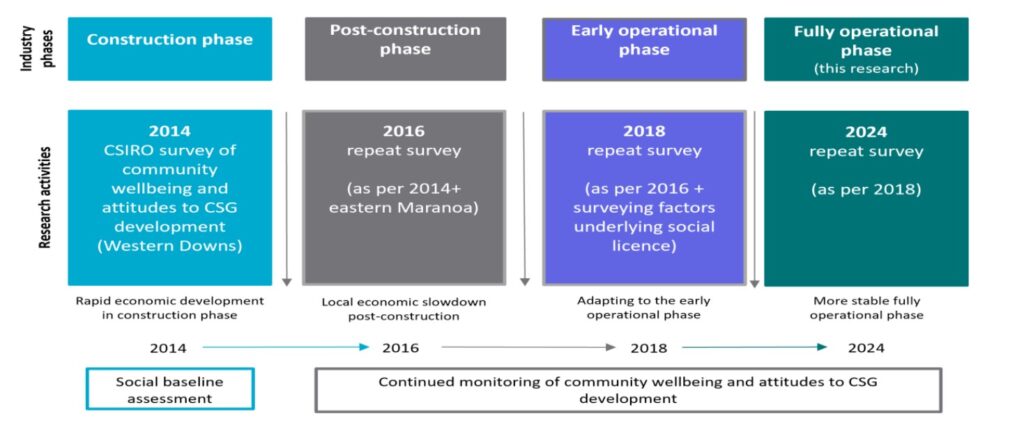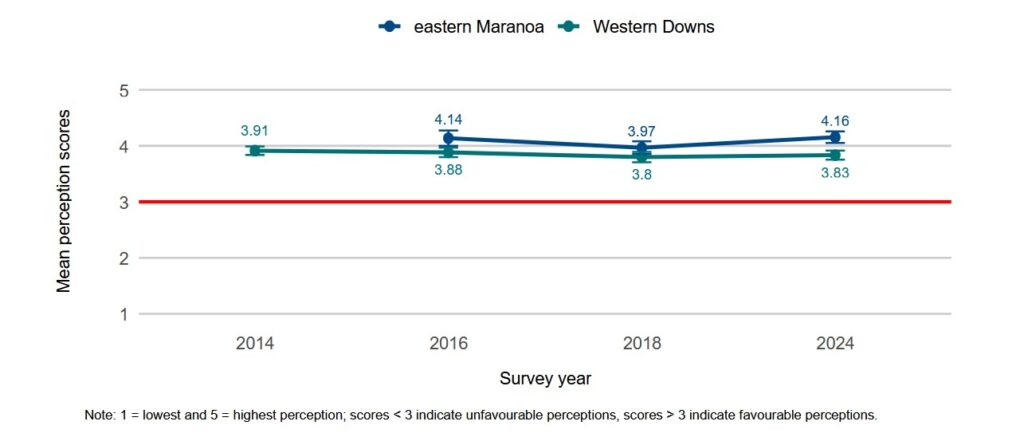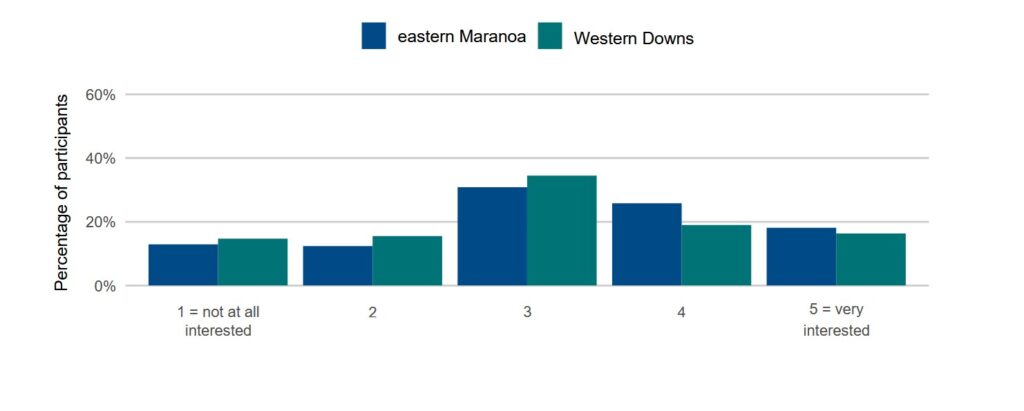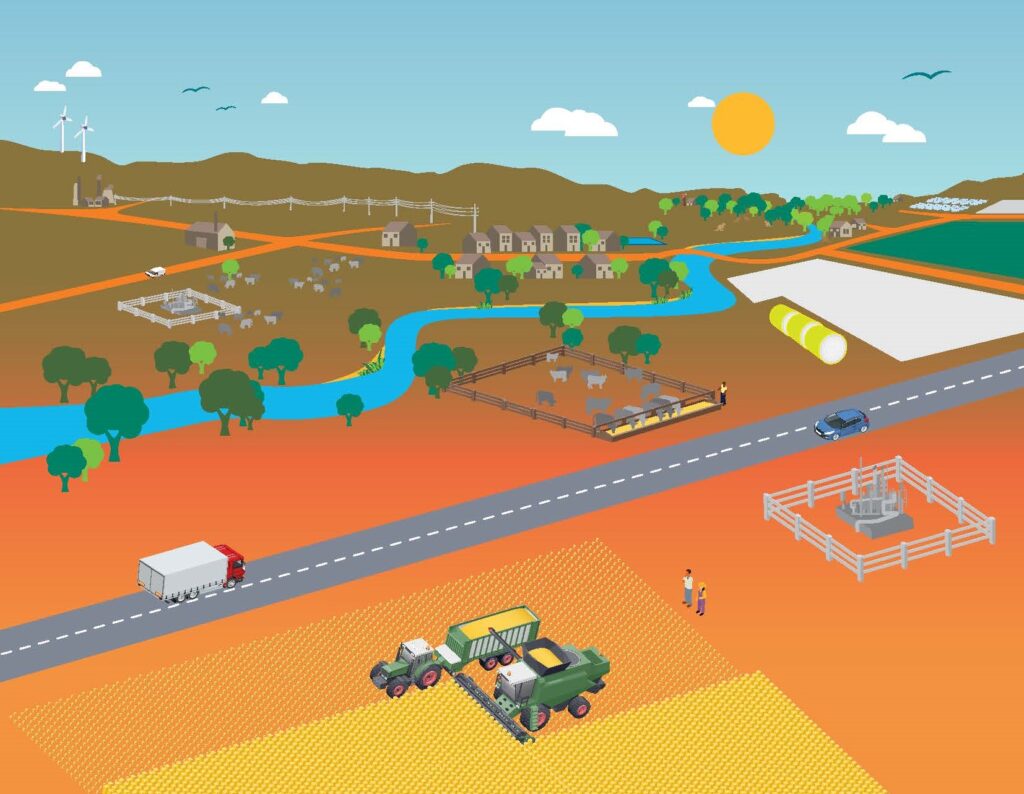A decade of research
For over a decade, the communities of Queensland’s Western Downs and eastern Maranoa regions have experienced changes from a new and expanding coal seam gas (CSG) development – a major industry contributing to the region’s economy, environment, and social fabric.
Now, a comprehensive longitudinal program of research by CSIRO’s Gas Industry Social and Environmental Research Alliance (GISERA) reveals that community wellbeing has remained robust throughout this period, while attitudes towards CSG have shifted in a more positive direction over time.
The studies are unique in Australia, and indeed internationally, in tracking community attitudes and wellbeing over an extended period, engaging the same regional communities across four points in time from 2014 to 2024. This decade-long approach allows researchers to understand how perceptions evolve in response to different phases of industry activity, from construction through to operation.

Four surveys conducted over the last decade
Four surveys conducted over the last decade
Dr Andrea Walton, Group Leader with CSIRO’s Adaptive Communities and Industries group, and lead author of the report, describes the project’s significance: “It is fairly unique to use the same survey tool, in the same region, over that length of time – particularly as it corresponds with different phases of the industry. This approach gives us a rich, nuanced picture of how communities are adapting.”
Co-author Dr Rod McCrea, a CSIRO Senior Social Scientist, reflects on the unexpected success of the ongoing surveys: “Initially, it was about baseline monitoring, but the strong responses from industry and government, and the positive community engagement meant we were able to secure funding and keep going. Ten years on, we have four surveys complete, and that continuity has provided valuable insights.”
Sustained community wellbeing amid change
CSIRO conducted four community surveys between 2014 and 2024, and the newly published report, Trends in community wellbeing and local attitudes to coal seam gas development, 2014-2024, conveys the findings of the fourth survey, but also reports on changes that have taken place over the decade 2014-2024.
For the 2024 survey, which took place from late-May to mid-July, a telephone survey was conducted with 601 residents from the Western Downs region and the eastern half of the Maranoa region (401 and 200 residents respectively). On average, the surveys took 30 minutes to complete.
A third-party research company administered the survey using a database of landline and mobile telephone numbers to randomly select residents based on pre-determined selection criteria and demographic quotas. The quotas were used to ensure a sufficient sample in each subregion, inclusion of those living in and out-of-town, and reasonable representation of gender and age. A similar approach had been taken across the previous three surveys in 2014, 2016, and 2018.
One of the standout findings is the sustained sense of community wellbeing from 2014-2024, that has occurred despite significant industry-driven change. Social factors such as community spirit, cohesion, local trust, and access to services and facilities have remained key drivers of wellbeing throughout the decade.

Overall community wellbeing: Western Downs and eastern Maranoa 2014 – 2024
Overall community wellbeing: Western Downs and eastern Maranoa 2014 – 2024
“Even though there was a lot of change across the decade, and many new people moving into the area, the communities maintained a strong sense of connection,” Dr McCrea says. “This held up better than we might have expected given some of the divisive narratives in the media.”
Dr Walton believes the results demonstrate that community wellbeing is multifaceted and not solely defined by the gas industry: “Life is not all about gas in these communities. While we focus on industry impacts, people’s lives continue in many other ways, and the social fabric – the trust and relationships that exist there – remains strong.”
Importantly, the surveys separated community wellbeing questions from those about CSG to avoid biasing responses. This approach confirmed that positive wellbeing was not simply a reflection of attitudes toward the industry.
Growing acceptance and changing perceptions of CSG
The report highlights a clear shift toward greater acceptance of coal seam gas over the 10 years. In the Western Downs, rejection of CSG dropped from 13.4% in 2016 to just 8% in 2024, while the combined proportion of residents who ‘accept’, ‘embrace’ or ‘approve’ of CSG grew to more than 60%. The eastern Maranoa, which has experienced CSG activity for longer, exhibited a similar pattern.
Dr Walton explains some of the reasons behind this shift: “Perceptions of negative impacts decreased, while the perceived benefits increased. Trust in industry governance and fairness also improved.”
Farmers directly involved with CSG activities, such as those with wells on their land, reported increased satisfaction with company dealings over time. “Although some concerns remain, especially about relationship quality and procedural fairness, the overall trend is positive,” Dr Walton says. “Seeing those improvements is really important.”

Interest in the local CSG industry: Western Downs and eastern Maranoa, 2024
Interest in the local CSG industry: Western Downs and eastern Maranoa, 2024
She noted that information networks played an important role: “People tend to get their information from family and friends, many of whom may be connected to the industry in some way, or from community forums where research findings are shared. Trust is key in how information spreads and influences perceptions.”
Interest in CSG itself has waned as the industry has become embedded in daily life. By 2024, over 40% of residents across both regions said they ‘never’ or ‘seldom’ think or talk about coal seam gas, indicating a level of adaptation.
Ongoing concerns and the importance of responsive governance
While attitudes have generally become more positive, the study acknowledges ongoing concerns. Environmental concerns, particularly around groundwater and water security, remain at the forefront for many residents, especially farmers.
Water is a precious and contested resource in rural Australia, and managing potential impacts is critical. Dr Walton emphasises the importance of responsive governance: “At the beginning of any large development project you can’t foresee all the problems that might arise or what their impacts might be.
“In these regions, some issues have emerged over time, but it’s very encouraging that government and industry have responded and continue to address them through regulation, compensation mechanisms and independent bodies, such as make-good legislation and the establishment of the Gas Fields Commission (now called Coexistence Queensland).”
The study highlights the importance of procedural fairness, quality relationships and good governance in building trust in the industry. Ensuring that local voices are heard and concerns are proactively managed remains vital for sustaining long-term social viability of CSG and any large-scale projects in these regions.
Lessons for the renewable energy sector
Interestingly, despite the more positive trajectory for CSG, the study found that community attitudes toward renewable energy infrastructure – such as wind and solar farms – were more polarised and in some cases less favourable than attitudes toward coal seam gas.
Dr Walton points to key lessons for the renewable energy sector: “Honest, respectful, and transparent communication is essential, as is minimising local impacts and delivering tangible benefits to communities, including environmental and economic gains.”

She adds that while outright rejection rates for renewables are higher in these regions, a majority still support renewable projects to some degree. “The renewable energy sector is in the early phases of community engagement, so there are issues to work through. The adaptive governance and trust-building approaches that have helped communities adapt to CSG development could be valuable here too.”
Dr McCrea agrees, noting that acceptance often grows over time as communities adapt: “People have adapted to gas partly because industry and government have responded to community concerns over time. Renewables are still at an early stage in these communities, so they may not yet have had the opportunity to address emerging concerns and build that trust.”
A valuable resource and insights for the future – interactive online data tool
To support communities in navigating change, CSIRO has developed an interactive online data tool that makes the study’s findings accessible to residents, stakeholders, and policymakers alike. This publicly available tool allows users to explore attitudes and wellbeing by region, town, and demographic group, providing a valuable resource for local planning and decision-making.
“We understand that not everyone wants to sit down and read through the full 120-page report, says Dr McCrea. “This tool offers a user-friendly way to engage with the rich data and drill down into the results in an interactive way. We developed something similar for an earlier project, and the feedback was very positive, with people using that tool in very varied ways. We hope communities will be able to use this to inform local planning and development, identify priority areas for directing resources or perhaps to support funding applications.”
The GISERA study reveals communities, navigating the social and economic shifts brought by coal seam gas development with strength and adaptability. Sustained wellbeing, growing acceptance of industry, and effective communication and governance strategies provide important guidance – not only for the gas sector but also for the expanding renewable energy industry in regional Australia.
As Dr Walton reflects “This research reminds us that while challenges remain, communities are dynamic and capable of adapting positively when their concerns are heard and addressed.”
Together, the data tool and these findings equip communities and policymakers with evidence-based support to foster social wellbeing through current and future industry transitions.
Read more about this research project
Dive deeper into survey results with the interactive online data tool
Find out about other GISERA social and economic research
Learn about other GISERA research in Queensland
